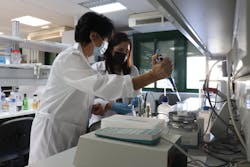A research group at the University of Córdoba, Spain, has produced a new eco-friendly technique for wastewater purification, with the aim to replace petroleum solvents.
The type of solvent, known as supramolecular solvents or SUPRAS, has enjoyed a boom of research in recent years due to their low toxicity, but they still have certain drawbacks.
"When used in large amounts of water, they behave unstably and, during the decontamination process, part of the solvent is lost," explained Ana Ballesteros, a researcher with the 'Supramolecular Analytical Chemistry' group who carried out the study.
The study managed to synthesize a new SUPRAS that, compared to other ecological solvents, behaves more stably under different temperature, pH and salinity conditions.
The team designed this sustainable solvent drawing on a type of biosurfactants called rhamnolipids, whose main characteristic is that they are produced naturally by a group of bacteria called Pseudomonas, widely found in nature.
As one of the authors of the study explains, the rhamnolipid attracts polluting molecules thanks to its ability to interact with them. Subsequently it is separated from the water, and then able to be decontaminated through decantation.
The work was carried out with natural water and fortified with different pollutants, explained Ana Ballesteros, and will later be applied to samples of wastewater, such as textile, in which contamination by dyes is quite frequent. The study represents a new way to use biodegradable and renewable solvents as an alternative to the use of synthetic products derived from petroleum.
SOURCE: University of Córdoba



